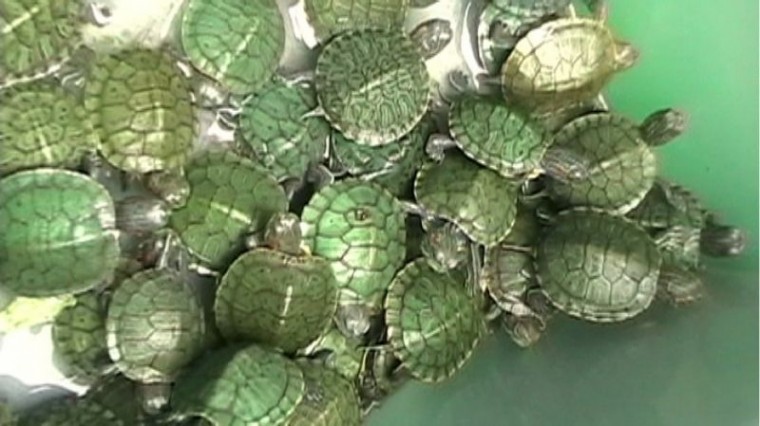
Perhaps more popular than mushrooms Saturday at the Mushroom
Mardi Gras were half-dollar sized red-ear slider turtles for sale
from a vendor near the west end of Third Street Promenade. By
Saturday afternoon, however, the vendor from San Francisco, also
selling bamboo, had his remaining 117, 1-inch long turtles seized
by the California Department of Fish and Game.
Perhaps more popular than mushrooms Saturday at the Mushroom Mardi Gras were half-dollar sized red-ear slider turtles for sale from a vendor near the west end of Third Street Promenade. By Saturday afternoon, however, the vendor from San Francisco, also selling bamboo, had his remaining 117, 1-inch long turtles seized by the California Department of Fish and Game.
Turtles smaller than 4-inches have been banned for sale – unless for educational purposes – by the U.S. Department of Health and Human Services via the Food and Drug Administration for two decades. The turtles are prone to carrying salmonella because children tend to touch the turtle and then their mouths, nose or eyes; and their small size is risky because children can fit the turtle in their mouths, and even choke.
Several Morgan Hill Police Department officers were on hand at the booth Saturday awaiting the arrival of Fish and Game warden Tyson Quintal, whose jurisdiction it is to handle the incident. MHPD questioned the vendor after receiving phone calls from worried Mardi Gras visitors who saw the tiny turtles.
The vendor initially told police officers that he was not selling turtles and kept his plastic 40-gallon bin under a table, but he eventually gave up the box that contained 117 turtles. The turtles were especially prone to carrying salmonella because of how they were housed in a plastic box of water, stacked on top of each other and sitting in feces-infested water.
The vendor said he had sold about 80 turtles that morning for $8 each. Many children and teens were seen carrying clear plastic cages around the festival. Quintal said anyone handling a turtle should always wash their hands after. He did not know if the turtles would have to be surrendered since they are illegal to have as pets.
Several children who found the “turtle guy” were disappointed to find out the turtles were illegal and no longer for sale.
Jennifer Swifteagle, a San Jose resident, called the Dept. of Fish and Game once she saw that the turtles were being sold at the festival. She said the vendor was telling children to wash their hands after handling the turtle, but despite his “honesty” she said, selling turtles that small is clearly illegal in the U.S.
“He was under the impression he could sell them because someone sold the turtles to him,” she said. The vendor said he paid about $400 for 200 turtles.
“It’s the law, and it happens a lot. People shipping turtles around. But now he’s going to have to pay for the consequences,” Swifteagle said. Swifteagle is Native American and was born and raised a reservation in South Dakota where she said she witnessed illegal sales of animals and animal products. She knows the law well, Swifteagle said.
“I’ve seen a lot of illegal things happen. And for me some things are for ceremonial purposes, so I don’t jive with that when I see this happening. (The vendor) was honest enough to tell the kids to be careful and wash your hands or you can get sick. But, he’s not familiar with the law.”
Quintal seized the turtles and was waiting to hear from the U.S. Department of Agriculture on how to proceed; whether he would turn the turtles over to an educational facility, release them or humanely disposing of the turtles.
It’s unknown if the vendor will be fined for the violation, though it likely will be referred to the District Attorney’s Office.








